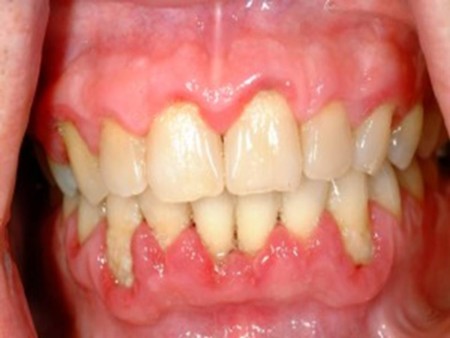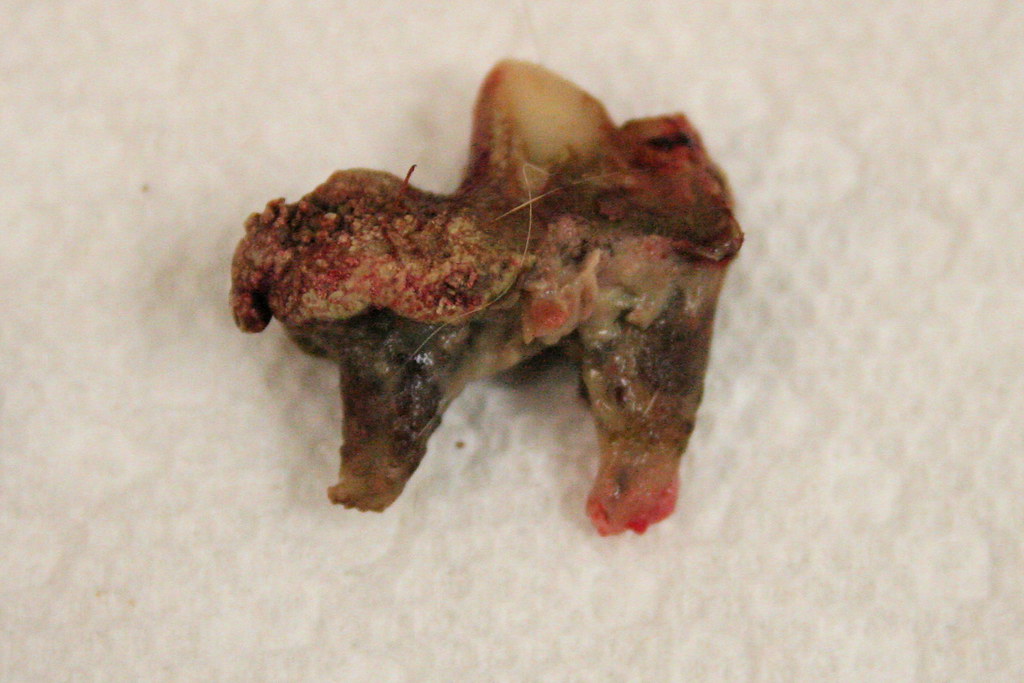
Periodontal (or gum) disease is a condition in which the soft tissues around the tooth and jaw bones become inflamed and damaged. It is most commonly caused by poor oral care habits, such as frequent brushing and regular flossing, which allow plaque, a sticky material of bacteria, to build up on your teeth. In extreme cases, periodontal disease may result in tooth loss; irritated, bleeding gums; and painful chewing problems.
Periodontal disease cannot be avoided; however, it can be controlled by brushing twice daily with a fluoride toothpaste, flossing three times a day, and visiting your dentist twice every six months for a professional cleaning. This is best done by using your dentist's mouth wash, which is designed to kill bacteria and restore the natural flora in your mouth. Oral hygiene is also a major factor of periodontitis, since it can cause gum disease to spread and weaken your gums. Therefore, your dentist will often recommend brushing twice daily, flossing at least once per day, and taking a daily supplement that is designed to help keep your mouth free of bacteria. Additionally, you can try using natural toothpastes that are made from plant sources to help control plaque buildup and fight gum disease.
Periodontal bacteria are able to thrive in your mouth without being attacked by your immune system, and this allows them to continue growing until they cause inflammation, pain, or infection around the tooth. When this occurs, they start multiplying and forming tartar, which is formed from deposits of dead cells. Tartar accumulates, hardens, and eventually causes an abscess.
In most cases, gum disease is easy to prevent
If you brush your teeth at least twice daily, floss at least twice a day, and take care of any gum disease as soon as it occurs, the chances of developing periodontitis are much less. In fact, many studies have been done that show that children who practice good oral hygiene have less risk of developing gum disease than children who do not. However, if the condition has advanced to the point where it is interfering with daily activities, it is important to visit your dentist.
Periodontal bacteria are often the first thing found on a dental x-ray; however, they are difficult to detect on an everyday basis. This is because they grow so slowly and are often concealed by the gums. If your gums have become irritated, they may bleed when they are brushed or flossed. Your dentist may perform an examination to determine whether you have periodontitis, but if he finds it to be clear or only slightly inflamed, treatment may be minimal and inexpensive.

The most common treatment is to remove the tartar, which is the deposit of dead tissues and bacteria left behind on your teeth by the periodontal bacteria and to clean the affected area with a special solution. If you have a severe case of periodontitis, your dentist will recommend surgery.
Most surgical treatments are done on an outpatient basis, and you will likely return to see the dentist once a year for checkups and regular dental cleanings. Most procedures are performed under local anesthesia; however, your dentist can also provide sedation to ensure your dental health during surgery. Your dental insurance should cover most of these treatments; however, some will require that you make co-payment payments.
Periodontal gum disease, while relatively easy to treat, may require that you see your dentist more often
If your gums get irritated during your treatment, they may bleed. If this happens, call your dentist immediately for emergency treatment.
Unfortunately, periodontal gum diseases are extremely contagious. They spread from person to person through direct contact with saliva that has been contaminated with bacteria. If you brush your teeth or use dental floss, there is a greater chance that plaque will be deposited between your teeth and gums. These plaques are the first things that your dentist will notice. If you do not brush after eating, you will be exposing yourself to this bacteria as well.
Periodontal disease is caused by the buildup of plaque on the teeth and gums, which in turn causes the formation of pockets that trap food particles. Bacteria will grow, resulting in the release of acids that cause inflammation, ulcers, and tartar. This acid will cause further damage to the tissues in the mouth and result in bleeding.
If you are in good dental health, you will have little to no chance of developing periodontal disease. However, for those suffering from a serious condition, regular dental care, brushing and flossing can help slow down and even prevent it. If you suspect you have developed gum disease, talk to your dentist about treatment options.
